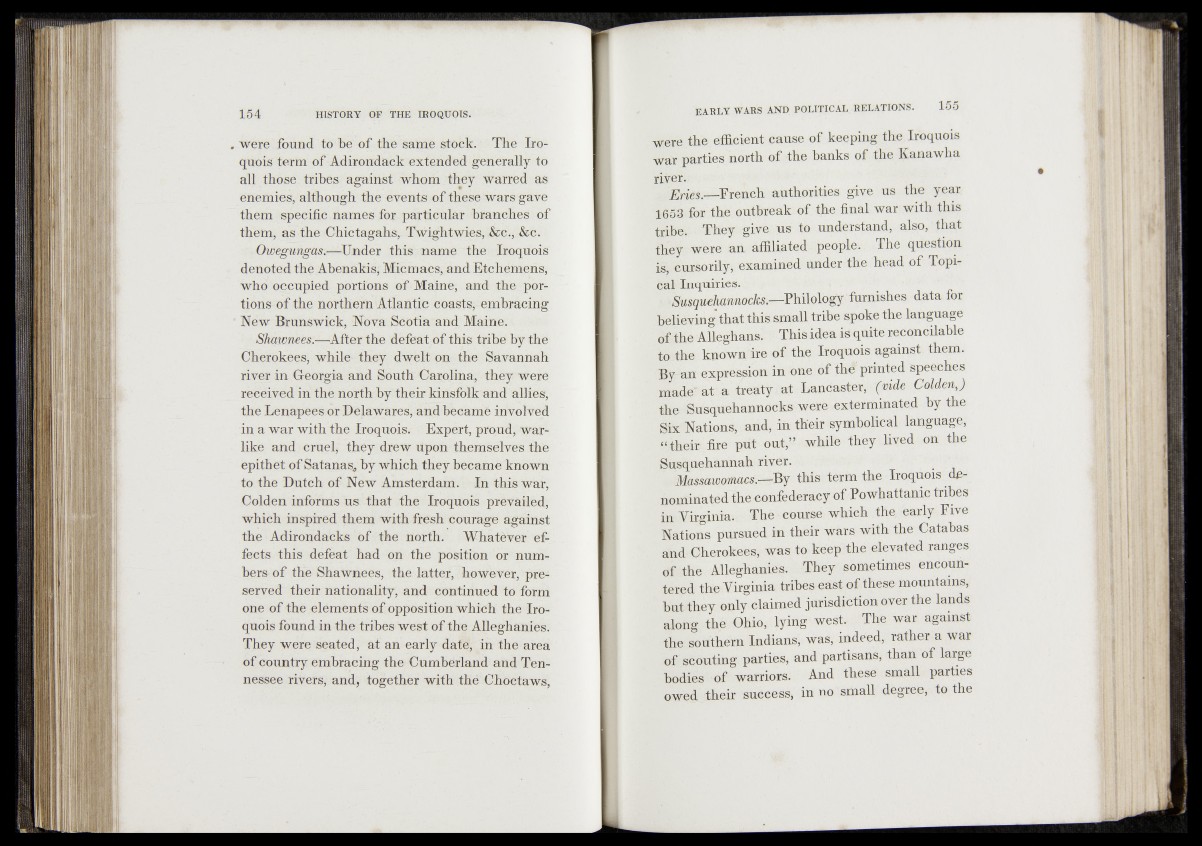
wore found to be of the same stock. The Iroquois
term of Adirondack extended generally to
all those-tribes against whom they warred as
enemies, although the events of these wars gave
them specific names for particular branches of
them, as the Ghictagahsy Twightwies, v&c., &c.
Owegungas.-^-1GBA.Gr this name the Iroquois
denoted the Abenakis, Micmacs, and Etchemens,
who occupied portions of Maine, and the portions
of the northern Atlantic coasts, embracing
New Brunswick, Nova Scotia and Maine.
Shawnees.—After the defeat of this tribe by the
Cherokees, while they dwelt on the Savannah
river in Georgia and South Carolina, they Were
received in the north by their kinsfolk and allies,
the Lenapces or Delawares, and became involved
in a war with the Iroquois. Expert, proud, warlike
and cruel, they drew upon themselves the
epithet of Satanas, by which they became known
to the Dutch of New Amsterdam. In this war,
Golden informs us that the Iroquois prevailed,
whieh inspired them with fresh courage against
the Adirondacks of the north. WhatèVer effects
this defeat had on the position or numbers
of the ShaWnees, the latter, however, preserved
their nationality, and continued to form
one of the elements of opposition which the Iroquois
found in the tribes west of the Alleghenies.
They were seated, at an early date, in the area
of country embracing the Cumberland and Tennessee
rivers, and, together with the Choctaws,
were the efficient cause of keeping the Iroquois
war parties north of the banks of the Kanawha
river. ,
Eries.-r—French authorities give us the year.
1653 for the outbreak of tjie final war with this
tribe. They give us to understand, also, that
they were an affiliated people. The question
is, cursorily, examined under the head of Topical
Inquiries. ' ' "
? *Swquehannocks.—Philology furnishes data for
believing* that this small tribe spoke the language
of the Alleghans. This idea is quite reconcilable
to the known ire of the Iroquois against them.
By an expression in one of th£printed speeches
made-at a treaty, at Lancaster, (vide CaldenJ
the^bsqufehannocks were exterminated by the
Six Nations, and, in their symbolical language,
“their fire put out,’’ while they lived on the
Susquehannah river. ' - ;MKf
iJiMassawomacs-—By this term the Iroquois^dp^
nominated the confederacy of Powhattanic tribes
in Virginia. The -course whieh the- early Five
Nations pursued in their wars with the Catabas
and Cherokees,1 was to keep The elevated ranges
Of the Alleghanies. They sometimes encountered
the Virginia tribes east of these mountains,
butthey only claimed jurisdiction over the lands
along the Ohio, lying west, . The war against
the southern Indians, was, indeed, rather a war
of scouting parties, and partisans, than of large
fedabs-#■ warriors And these small parties
owed their success, in no small degree, to the